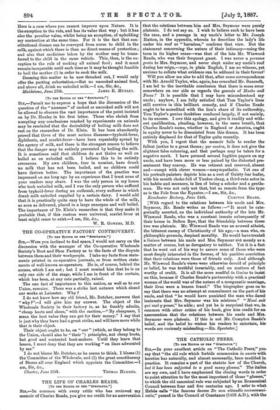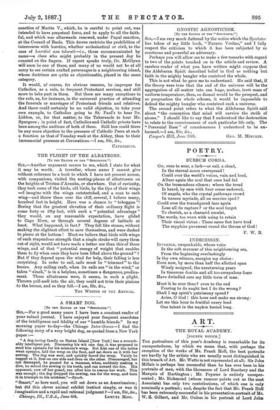THE CATHOLIC PEERS.
[To on Maros or THE SPECTET01."J Sth.,—In your excellent article on "The Catholic Peers," you say that "the old rule which forbids communion in semis with heretics has naturally, and almost necessarily, been modified in practice. It remains a part of the etatute law of the Church, but it has been subjected to a good many glosses." The italics. are my own, and I have emphasised the closing words in order to point attention to-far the moat important of those " glosses," to which the old canonical rule was subjected by an Ecumenical Council between four and five centuries ago. I refer to what Hefele yells "the famous decree De non vitandis excommuni- catis," passed in the Council of Constance (1418 A.D.), with the sanction of Martin V., which, he is careful to point out, was intended to have perpetual force, and to apply to all the faith- ful, and which was afterwards renewed, under Papal sanction, at the Council of Basle. This decree restricts the prohibition of intercourse with heretics, whether ecclesiastical or civil, to the ease of lueretici non toterati—i.e., those excommunicated by name—a class who might probably in the present day be counted on the fingers. If report speaks truly, Dr. McGlynn will soon be one of these, and many of us would not be at all sorry to see certain exalted personages in a neighbouring island, whose doctrines are quite as objectionable, placed in the same category.
It would, of course, for obvious reasons, be improper for Catholics, as a rale, to frequent Protestant services, and still more to take part in them. But there are many exceptions to the rule, as, for instance, in the universal practice of attending the funerals or marriages of Protestant friends and relatives. And there could certainly be no valid objection, to take your own example, to Catholics going to St. Paul's to hear Dr. Liddon, or, for that matter, to the Tabernacle to hear Mr. Spurgeon ; in point of fact, Catholics and Catholic priests have been among the auditors of both of them. Still ess could there be any more objection to the presence of Catholic Peers at such a function as that of Tuesday week at the Abbey, than to their immemorial presence at Coronations.—I am, Sir, &c., CATTIOLICUS.



































 Previous page
Previous page